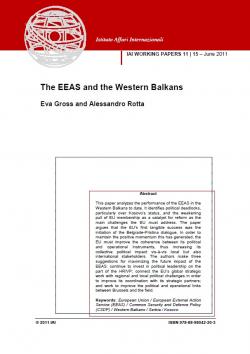The EEAS and the Western Balkans
This paper analyzes the performance of the EEAS in the Western Balkans to date. It identifies political deadlocks, particularly over Kosovo’s status, and the weakening pull of EU membership as a catalyst for reform as the main challenges the EU must address. The paper argues that the EU’s first tangible success was the initiation of the Belgrade-Pristina dialogue. In order to maintain the positive momentum this has generated, the EU must improve the coherence between its political and operational instruments, thus increasing its collective political impact vis-à-vis local but also international stakeholders. The authors make three suggestions for maximizing the future impact of the EEAS: continue to invest in political leadership on the part of the HR/VP; connect the EU’s global strategic work with regional and local political challenges in order to improve its coordination with its strategic partners; and work to improve the political and operational links between Brussels and the field.
Una versione precedente del documento è stata discussa al seminario su "The EU as a Global Actor: Challenges for the European External Action Service", organizzato da Centro studi sul federalismo (CSF), European Policy Centre (EPC) e Istituto Affari Internazionali (IAI), Torino, 8 aprile 2011.
-
Dati bibliografici
Roma, Istituto Affari Internazionali, giugno 2011, 8 p. -
Numero
11|15 -
ISBN/ISSN/DOI:
978-88-98042-20-3
Introduction
1. The Western Balkans: outstanding policy challenges
2. The EEAS and the Western Balkans: the challenges of leadership and of coherence
3. Kosovo: a litmus test
4. Conclusion. The EEAS and the Western Balkans: a Tale of Unfulfilled Potential?




